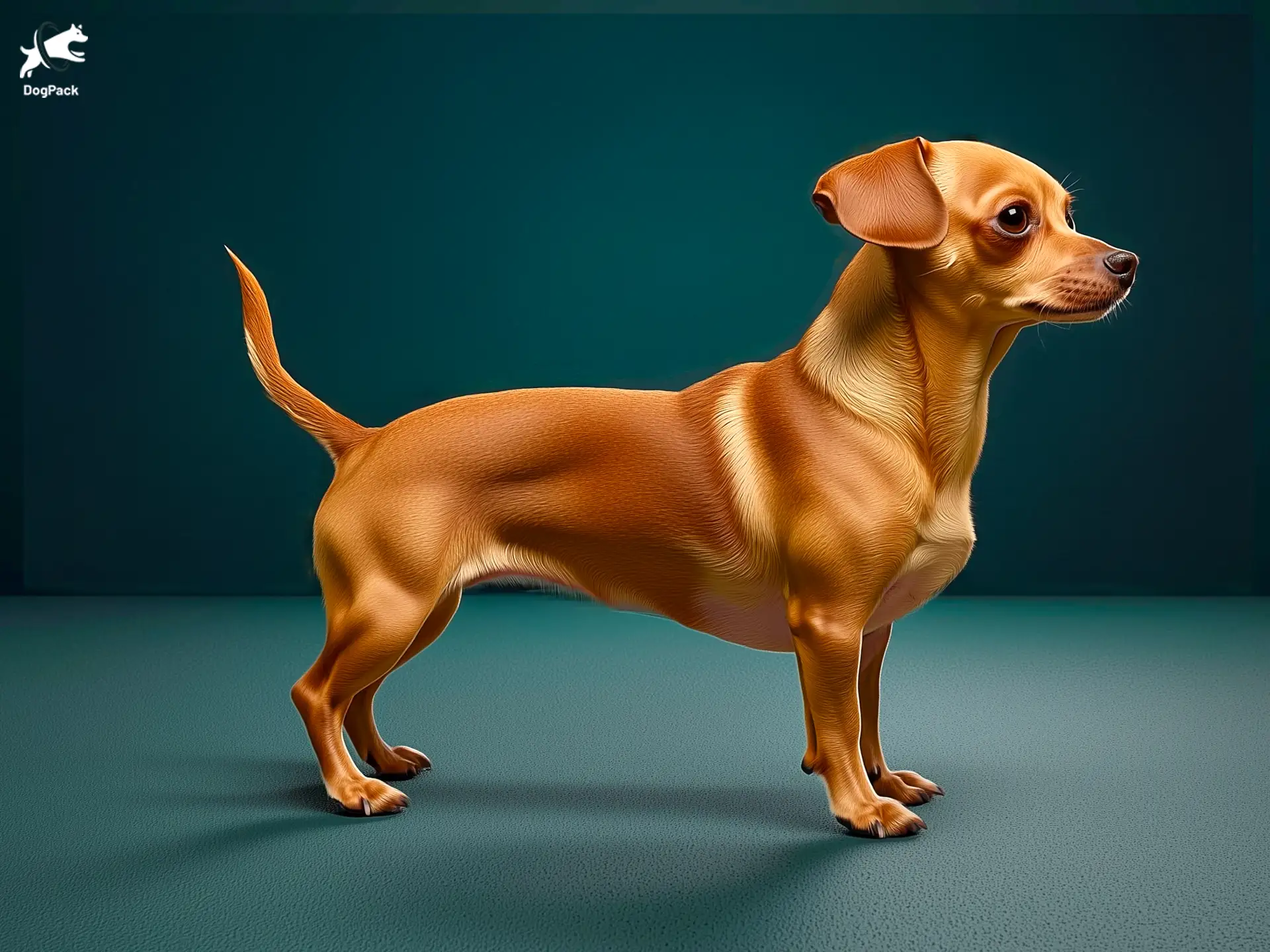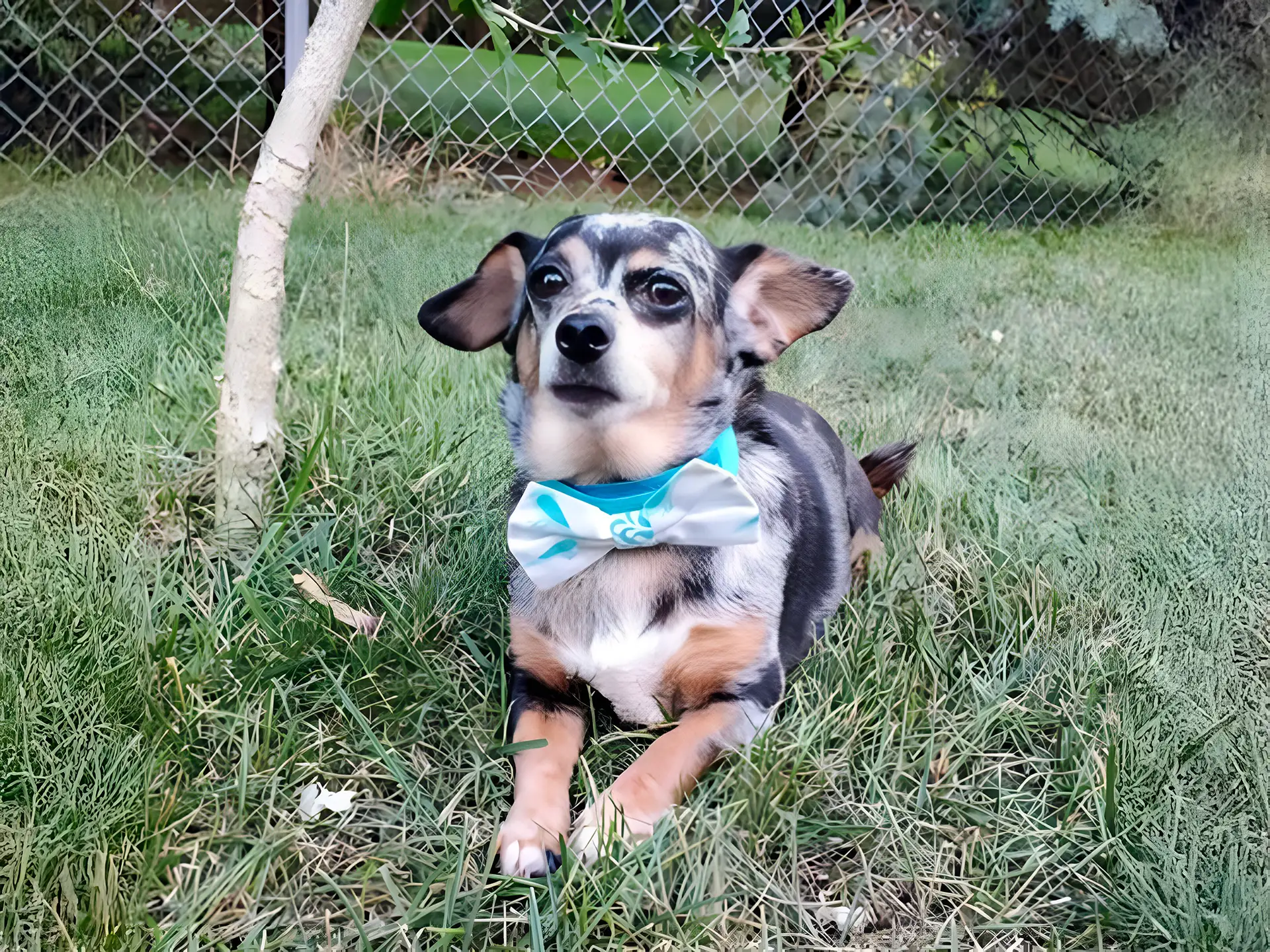Chiweenie Dog Breed Info & Overview
The Chiweenie, a bold blend of Chihuahua confidence and Dachshund determination, is a small dog with a lion-sized heart. This spirited crossbreed is as cuddly as it is courageous, bringing both loyalty and charm to any home. With their unique “hot dog” body and big personality, Chiweenies make delightful companions for those seeking a pint-sized pup with an adventurous spirit.
Characteristics
Pictures
Breed History
While the Chiweenie is a relatively new hybrid, this charming mix has quickly captured hearts since emerging in the 1990s. Bred to combine the best traits of the Chihuahua and the Dachshund, these little dogs were initially popularized in the United States as delightful companion pets.
The idea was to create a small dog with the Dachshund’s elongated body and the Chihuahua’s spirited personality. Their compact size and affectionate nature made them ideal for urban dwellers seeking a loyal friend. Over time, the Chiweenie has gained recognition as a beloved designer breed.
The name “Chiweenie” is a playful blend of its parent breeds’ names—”Chi” from Chihuahua and “Weenie” from Dachshund’s nickname “wiener dog.” This mix not only reflects their lineage but also hints at their fun-loving and quirky character.
Temperament, Personality
Chiweenies are known for their big personalities packed into small bodies. They’re affectionate and form strong bonds with their owners, often choosing a favorite person to shower with loyalty. Their playful and energetic nature means they’re always up for a game or a snuggle on the couch.
These dogs can be a bit wary of strangers, inheriting a touch of the Chihuahua’s watchful demeanor. Early socialization is key to ensuring they become well-rounded companions. With proper introduction, they can get along with other pets, though their Dachshund side may bring out a bit of a hunting instinct.
When it comes to children, Chiweenies do best with older kids who understand how to handle small dogs gently. Their small size makes them delicate, and they may not tolerate rough play. Overall, they thrive in loving environments where they are treated as part of the family.
Physical Characteristics
Chiweenies are small dogs, typically weighing between 5 to 12 pounds (2–5 kg) and standing 6 to 10 inches (15–25 cm) tall. They often inherit the Dachshund’s elongated body and short legs, combined with the Chihuahua’s petite frame. This gives them a unique and endearing appearance similar to other small dog breeds.
Their coats can vary widely, ranging from short and smooth to longer and wiry, depending on which parent’s genes are more dominant. Colors span from solid shades like black, brown, and tan to mixed patterns. Some even sport the Dachshund’s distinctive dappled or brindle markings.
Chiweenies may have erect ears like a Chihuahua or floppy ears like a Dachshund, adding to their charming unpredictability. Their expressive eyes and alert expressions make them particularly photogenic and beloved by their owners.
Health Issues
Like all breeds, Chiweenies can be prone to certain health issues inherited from their parent breeds. Common concerns include dental problems due to their small mouths, so regular teeth cleaning is essential. Patellar luxation, a condition affecting the kneecap, can also occur.
Back problems such as intervertebral disc disease may be inherited from the Dachshund side, especially given their elongated spines. It’s important to prevent them from jumping off high surfaces to minimize strain on their backs. Regular vet check-ups can help catch and manage these issues early. According to the American Veterinary Medical Association, preventive care is key to maintaining your pet’s health.
Obesity is another concern, as extra weight can exacerbate joint and back problems. A balanced diet and appropriate exercise are crucial for maintaining a healthy weight. Overall, with proper care, Chiweenies can lead long, healthy lives.
Grooming Needs
Chiweenies are relatively low-maintenance when it comes to grooming. Their coat type can vary, but most have short to medium-length hair that requires minimal brushing—usually once or twice a week—to keep it healthy and shiny.
Bathing should be done as needed, typically once a month or when they get particularly dirty. Be cautious not to over-bathe, as it can strip the natural oils from their skin. If your Chiweenie has longer hair, occasional trims may be necessary to prevent tangles.
Don’t forget about their ears and nails. Regular ear checks can prevent infections, especially if they have floppy ears. Nails should be trimmed regularly to keep them comfortable and prevent overgrowth. Dental hygiene is also important; brushing their teeth several times a week is recommended.
Exercise Requirements
Despite their small size, Chiweenies are active little dogs that enjoy regular exercise. A daily walk of 30 to 60 minutes, coupled with some playtime, will keep them physically and mentally stimulated. They love exploring and sniffing around, so varied routes can add excitement.
Interactive games like fetch or puzzle toys can provide both exercise and mental enrichment. However, be mindful of extreme temperatures; their small bodies can be sensitive to cold and heat. Always ensure they’re comfortable during outdoor activities.
Indoor play can also suffice on days when outdoor exercise isn’t possible. Chiweenies are adaptable and can burn off energy with a good game of tug-of-war or chasing a ball around the living room. Keeping them engaged helps prevent boredom and unwanted behaviors.
Training Tips
Chiweenies are intelligent but can have a stubborn streak, thanks to their Chihuahua and Dachshund heritage. Consistent and positive reinforcement training methods work best. Using treats and praise will motivate them to learn new commands and behaviors.
Early socialization is crucial to help them become well-adjusted adults. Exposing them to different people, environments, and other animals can reduce tendencies toward shyness or aggression. Patience is key, as they may take a bit longer to house-train than some breeds.
Avoid harsh corrections, as these can lead to fearfulness or anxiety. Short, fun training sessions will keep them engaged. Enrolling in puppy classes can also provide structure and help address any specific training challenges you might encounter with your Chiweenie.
Nutrition, Diet
Chiweenies have small stomachs but high energy levels, requiring a balanced diet that meets their nutritional needs. High-quality dog food formulated for small breeds is ideal, as it provides the necessary calories in smaller kibble sizes suitable for their mouths.
Portion control is important to prevent obesity. Typically, they need about 1/2 to 1 cup of dry food per day, divided into two meals. The exact amount can vary based on their age, weight, and activity level. Consulting your vet can help determine the optimal feeding schedule for your Chiweenie. For more information on canine nutrition, the Association ofAmerican Feed Control Officials provides guidelines on pet food standards.
Due to their potential for dental issues, dry kibble can help reduce tartar build-up. Some Chiweenies may have food sensitivities, so monitoring for any digestive upset when introducing new foods is advisable. Avoid overindulging them with treats, and opt for healthy options when rewarding good behavior.
Adoption, Breeders
Finding a Chiweenie can be as simple as checking local shelters or rescue groups that specialize in small or mixed breeds. Many Chiweenies are in need of loving homes, and adoption can be a rewarding way to bring one into your family. For more information and to connect with other Chiweenie enthusiasts, consider joining the Chiweenie Dog Lovers Facebook group. This community offers valuable insights, advice, and support for current and prospective Chiweenie owners.
If you prefer to go through a breeder, it’s crucial to choose one who is reputable and prioritizes the health and well-being of their dogs. Ask for health clearances of the parent dogs and visit the breeding facility to ensure ethical practices. The American Canine Hybrid Club is a resource that recognizes the Chiweenie.
Online platforms like Petfinder can help you locate Chiweenies available for adoption in your area. Additionally, the Dachshund Rescue of North America sometimes has Chiweenies in need of homes. Always do thorough research to find the best match for your family.
Family Pet?
Chiweenies can make wonderful family pets, especially in households with older children who understand how to interact gently with small dogs. Their affectionate nature means they often form strong bonds with family members and enjoy being involved in daily activities.
They may be cautious around young children who might play too roughly, so supervision is recommended. With other pets, early socialization helps them get along, though they might exhibit a bit of jealousy or territorial behavior without proper introduction.
Their adaptable size and moderate exercise needs make them suitable for various living situations, including living with seniors. As long as they receive plenty of love and attention, Chiweenies can thrive in a family environment.
Right For You?
If you’re looking for a small dog with a big personality, the Chiweenie might be the perfect match. They’re ideal for individuals or families who can provide plenty of companionship and aren’t away from home for long periods.
Their moderate exercise needs mean they don’t require extensive outdoor space, making them suitable for apartment living. However, they do need mental stimulation and interaction to keep them happy and prevent boredom.
Potential owners should be prepared for a bit of stubbornness during training and take the time for proper socialization. If you value loyalty, enjoy a playful companion, and can commit to their care needs, a Chiweenie could be a delightful addition to your life.
Conclusion
Chiweenies offer a unique blend of charm, affection, and spunk that can brighten any home. Their small size and adaptable nature make them suitable for a variety of living situations, from bustling families to single seniors. While they may present some training challenges and require mindful handling due to their size, the rewards of their companionship are well worth the effort. If you’re ready to welcome a lively, loving, and loyal friend into your life, the Chiweenie might just be the perfect fit.
FAQs
-
What is the Chiweenie’s barking tendency?
Chiweenies can be quite vocal, often inheriting the Chihuahua’s propensity to bark. They may alert you to strangers or unfamiliar noises. Proper training and socialization can help manage excessive barking and ensure they respond appropriately to their environment.
-
Are Chiweenies hypoallergenic?
No, Chiweenies are not considered hypoallergenic. They typically have low to moderate shedding coats, which can produce dander that triggers allergies. Those with sensitivities should spend time with the breed before adopting to gauge their reaction.
-
How long do Chiweenies usually live?
Chiweenies have a relatively long lifespan for small dogs, typically living between 12 to 16 years. Proper care, regular veterinary check-ups, and a healthy lifestyle can contribute to a longer, happier life for your Chiweenie.
-
Do Chiweenies get along with cats?
Chiweenies can get along with cats if they’re socialized with them from a young age. However, due to their Dachshund heritage, they may have a prey drive that leads them to chase smaller animals. Supervised introductions and ongoing training can foster peaceful coexistence.
-
What kind of toys do Chiweenies like?
Chiweenies enjoy toys that challenge their minds and satisfy their chewing instincts. Puzzle toys, small chew toys, and interactive games are great choices. They often appreciate toys that mimic prey, tapping into their natural hunting tendencies.
Breed Ratings
Chiweenies are moderately intelligent but can be stubborn. Consistent, positive training methods are needed to tap into their smarts.
They love to play and engage with their owners. Interactive games and toys keep them entertained and strengthen your bond.
With moderate energy, they enjoy daily walks and playtime but also appreciate downtime cuddling on the couch.
Shedding is generally low to moderate, making grooming relatively easy but not entirely maintenance-free.
They may have a moderate prey drive due to their Dachshund lineage, occasionally chasing small animals or moving objects.
Chiweenies typically have low grooming needs, requiring minimal brushing and infrequent baths to stay clean.
Training can be challenging due to occasional stubbornness. Patience and positive reinforcement are key to success.
They prefer company and may experience separation anxiety if left alone for long periods. They thrive with attentive owners.
Prone to barking, they can be vocal in alerting their owners to strangers or unusual sounds. Training can help manage this.
Drooling is minimal, making them a tidy choice for owners concerned about slobber around the house.
With proper socialization, they can get along with other dogs but may exhibit territorial behavior without it.
Generally healthy but prone to certain genetic issues. Regular vet visits and preventive care are important.














